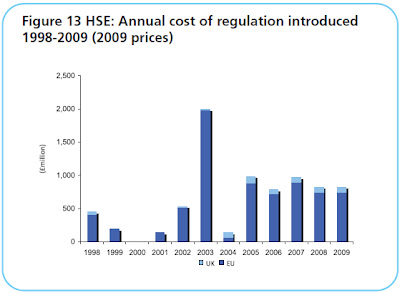 |
| Edmund Stoiber presents his report |
As we have been going on about the costs of EU regulation long before it became fashionable - compiling the first ever overall cost figure for EU regulation based on UK government impact assessments in 2009 - this has been a report we have been eagerly anticipating.
- Adopting a new EU Action programme and strengthening existing EU programmes for reducing overall regulatory costs such as REFIT, as well as setting a net target for reducing regulatory costs and publishing annual statements of the total net cost or benefit of new legislative proposals,
- Setting a net target for reducing EU regulatory costs,
- Introducing a system of offsetting new burdens on businesses stemming from EU legislation by removing existing burdens from elsewhere in the acquis,
- Rigorously applying the “Think Small First” principle and competitiveness test to all proposals, with SMEs and micro-businesses be exempted from EU obligations as far as possible,
- Developing a common EU methodology to measure regulatory costs and benefits and making the evaluation of all EU legislation compulsory on the basis of this in order to measure actual outcomes against original objectives before any proposals for revision or new legislation are made,
- Declaring a political commitment to focus only on those interventions which are indispensable at the EU level and which add the greatest value compared with national or regional action,
- Empowering an independent body to scrutinise the Commission´s impact assessments before the legislative proposal is adopted by the Commission and to assess the evidence base and costs and benefits supporting legislative amendments by the European Parliament and Council before the legislation is adopted.
Overall, the recommendations are very welcome and reflect many of the proposals that we have been championing for some time - for example, we first proposed an independent impact assessment board with "real teeth" back in 2009. The report also overlaps with David Cameron's business taskforce report published last year, albeit the Stoiber report does not explicitly call for the adoption of a 'one in, one out' principle when it comes to new regulation. Also, the report does not address big questions like the extent to which the EU should be involved in social and employment policy and the impact of the European Court of Justice in increasing the costs of EU regulation via the back-door as has happened most notably in the case of the Working Time Directive (which the report does not mention).
Nonetheless the report - together with the nomination of Frans Timmermans as Commissioner for better regulation in a generally reform-orientated Commission - is indicative of a cultural shift within the Commission away from regulation as a process in of itself towards securing concrete outcomes and addressing business concerns. It is certainly, among other things, a nod to concerns raised around the EU and the UK in particular about the EU's tendency to over-regulate and impose excessive costs on businesses and consumers.
In fact yesterday's Guardian reported that Stoiber explicitly referenced the need to keep the UK on board, and in presenting the report he argued - as passionately as it is possible to when discussing EU regulation - in favour of an EU that is less obtrusive, heavy-handed and opaque. He also admitted that in the past, many politicians and EU officials had seen any EU-level regulation - regardless of its desirability or suitability - as a means to advance the 'EU cause', but that such thinking was now history (although we would say it hasn't completely gone away).
Overall, it is clear there is a real opportunity to create a more enterprise and business-friendly single market. However, as ever with EU reform the challenge for the new Commission and for national governments will be to translate the rhetoric into concrete action. The fact that the Commission President Barroso has seemingly rejected one of the proposals already - for an independent impact assessment board is concerning.
.@BarrosoEU doesn't support idea of independent body to control impact assessments. "Commission is sufficiently independent & strong."
— Jarno Hartikainen (@JarnoHa) October 14, 2014
This suggests the Commission is nervous about independent scrutiny of its cost estimates for new EU regulation. An independent IA board would be better at catching out harmful proposals - such as the infamous olive oil jug ban - and delivering more measured verdicts on politically contentious issies such as the proposed FTT, where major problems with the Commission’s proposal emerged after it had been tabled and undergone an internal impact assessment. The Commission's resistance suggests that despite much progress, there is still some way to go.





 The graph illustrates the number of "Judgements concerning failure of a member state to fulfil its obligations" - in plain English, the number of times a country either broke or refused to implement EU law. We note that ten member states, including countries as diverse as the UK, Bulgaria, Denmark, Latvia and Slovakia, ended 2011 with a clean sheet. Gold stars to them.
The graph illustrates the number of "Judgements concerning failure of a member state to fulfil its obligations" - in plain English, the number of times a country either broke or refused to implement EU law. We note that ten member states, including countries as diverse as the UK, Bulgaria, Denmark, Latvia and Slovakia, ended 2011 with a clean sheet. Gold stars to them.




